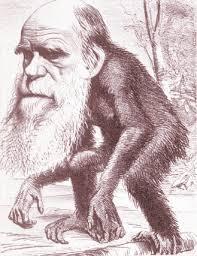Meanwhile, back in Kansas. . . .
Assuming that the looming government shutdown leaves the federal court system more or less intact, the court in my home state of Kansas will soon be hearing yet another case about the teaching of evolution in public schools. Which can only mean one thing: the completely phony battle between evolution and “intelligent design” is about to become the next major battle in the national fight over the Common Core.
I say that this is a “phony battle” because, well, it is a phony battle. Evolution and intelligent design are not opposites. They are not even the kinds of things that can be opposites. They are not apples and oranges. They are apples and the French Revolution. Follow me for a minute.
Intelligent Design (ID) is a cosmic master narrative—a big, complete story about the nature and purpose of the universe. The opposite of Intelligent Design is “Dumb Luck” (DL)—or the theory that everything just happened, without anybody or anything setting it in motion. According to the theory of Dumb Luck, molecules gradually developed the ability to replicate themselves, without any help from anybody, and all life on earth is the result of a competition between replicators for more space within which to replicate.
For the record, in the debate between Intelligent Design and Dumb Luck, I come down on the side of Intelligent Design. I do not believe, however, that either ID or DL should be taught in science classes, as neither one of them is the sort of theory that science is equipped to explain. They do not produce the kinds of predictions that can be falsified, nor do they support the kinds of experiments that scientists can do. They are not scientific hypotheses, but philosophical propositions, and the right place to discuss philosophical propositions is in a philosophy class.
Evolution by natural selection is not a cosmic master narrative. It isa specific mechanism by which organisms change over long periods of time. It is a deceptively simple mechanism that includes only three steps: 1) a population of organisms contains some variation; 2) some individual organisms are more successful in their environment than others as a result of these variations; and 3) successful organisms pass the traits that made them successful on to their offspring. We can watch it happen in a petri dish, and, whether we are talking about dinosaurs or microbes, the mechanism works the same.
The specific mechanism of natural selection works equally well as part of either one of the cosmic master narratives. It could be part of an Intelligent Design (which would require a really intelligent designer, but that's kind of the point) or it could be just one of the series of lucky breaks that go into the cosmic theory of Dumb Luck. It is not necessary to decide which cosmic narrative to subscribe to before learning how the mechanism works.
And no other mechanism that has ever been proposed can meet the scientific demands of explaining how stuff got here. The most commonly proposed alternative to the theory of evolution by natural selection is the “God Went Poof” theory (GWP) that holds that some time between four billion years ago and around 6,000 BC, God (or some combination of gods) went “poof,” and everything just kind of appeared the way we see it right now. I personally have no problem with the idea of a God powerful enough to go "poof" and create the universe. But I have a big problem with a God who would spend the next few billion years planting false clues to make it look like natural selection.
Talking about, and debating, cosmic master narratives is important, and I am all for presenting both sides of the controversy. But leave the specific mechanisms out of it. Without an understanding of evolution by natural selection, our children simply cannot understand science as it is practiced in the 21st century. And teaching them that the most successful and supported scientific principle of the past 150 years is on par with magic borders on child abuse. Neither religion nor science are served by casting them as irreconcilable opposites when there is not even a good reason to do so.
